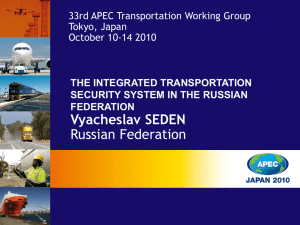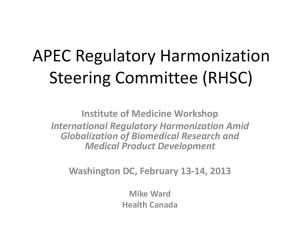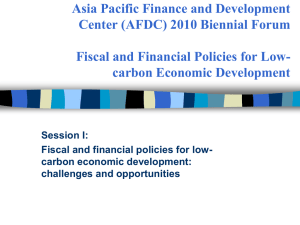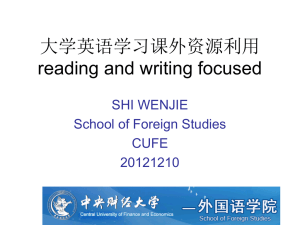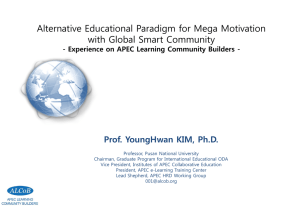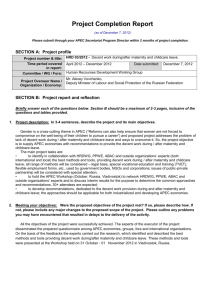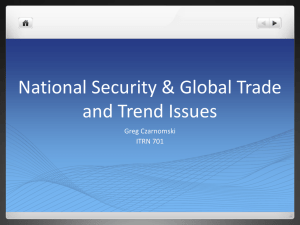PPSTI 06 2015S Use of Weather n Climate Info for Disaster Risk Mgt
advertisement
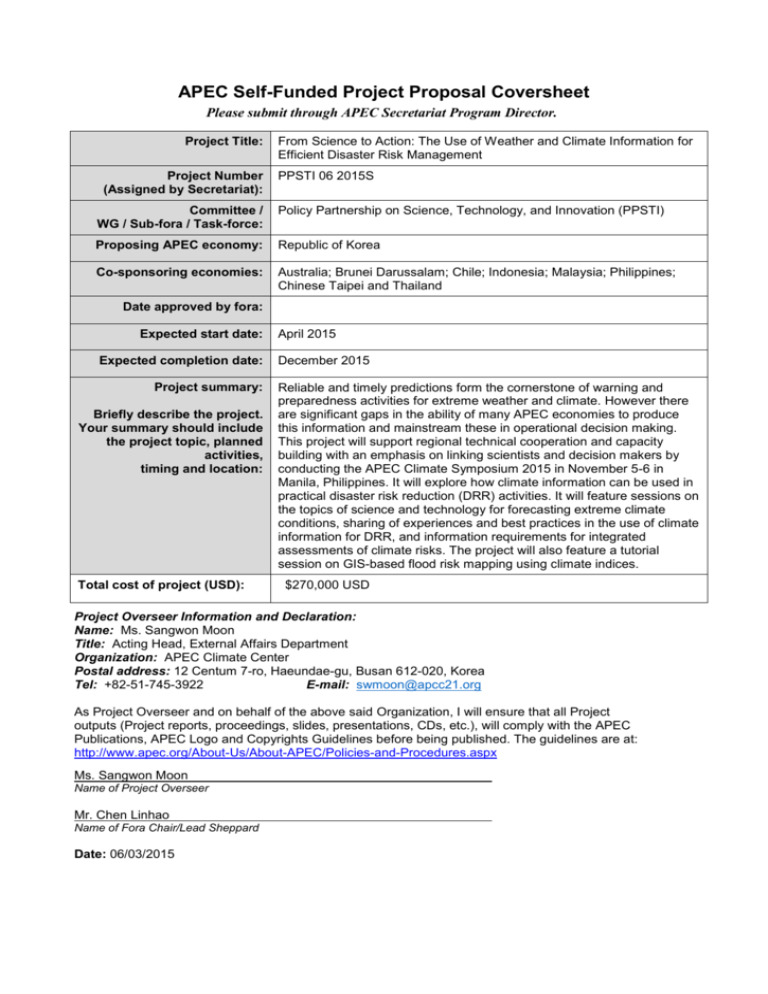
APEC Self-Funded Project Proposal Coversheet Please submit through APEC Secretariat Program Director. Project Title: Project Number (Assigned by Secretariat): From Science to Action: The Use of Weather and Climate Information for Efficient Disaster Risk Management PPSTI 06 2015S Committee / WG / Sub-fora / Task-force: Policy Partnership on Science, Technology, and Innovation (PPSTI) Proposing APEC economy: Republic of Korea Co-sponsoring economies: Australia; Brunei Darussalam; Chile; Indonesia; Malaysia; Philippines; Chinese Taipei and Thailand Date approved by fora: Expected start date: Expected completion date: Project summary: Briefly describe the project. Your summary should include the project topic, planned activities, timing and location: Total cost of project (USD): April 2015 December 2015 Reliable and timely predictions form the cornerstone of warning and preparedness activities for extreme weather and climate. However there are significant gaps in the ability of many APEC economies to produce this information and mainstream these in operational decision making. This project will support regional technical cooperation and capacity building with an emphasis on linking scientists and decision makers by conducting the APEC Climate Symposium 2015 in November 5-6 in Manila, Philippines. It will explore how climate information can be used in practical disaster risk reduction (DRR) activities. It will feature sessions on the topics of science and technology for forecasting extreme climate conditions, sharing of experiences and best practices in the use of climate information for DRR, and information requirements for integrated assessments of climate risks. The project will also feature a tutorial session on GIS-based flood risk mapping using climate indices. $270,000 USD Project Overseer Information and Declaration: Name: Ms. Sangwon Moon Title: Acting Head, External Affairs Department Organization: APEC Climate Center Postal address: 12 Centum 7-ro, Haeundae-gu, Busan 612-020, Korea Tel: +82-51-745-3922 E-mail: swmoon@apcc21.org As Project Overseer and on behalf of the above said Organization, I will ensure that all Project outputs (Project reports, proceedings, slides, presentations, CDs, etc.), will comply with the APEC Publications, APEC Logo and Copyrights Guidelines before being published. The guidelines are at: http://www.apec.org/About-Us/About-APEC/Policies-and-Procedures.aspx Ms. Sangwon Moon Name of Project Overseer Mr. Chen Linhao Name of Fora Chair/Lead Sheppard Date: 06/03/2015 Project Synopsis 1. Relevance – Benefits to region: The Asia Pacific is the most disaster-prone region in the world. In the past 10 years, more than 700,000 deaths due to natural disasters occurred, 1.5 billion people were affected, and economic damages exceeded US $560 billion (UNESCAP 2014). The use of climate information for disaster risk reduction (DRR) and their application into policy and decision making processes can deliver efficiencies in the programming of work and funding, improve alignments with development objectives, and increase resilience in communities and systems. Reliable and timely predictions form the cornerstone of warning and preparedness activities. However there are significant gaps in the ability of many APEC economies to produce this information and mainstream these in operational decision making. This project will support regional technical cooperation and capacity building by conducting the APEC Climate Symposium 2015 that will explore how climate information can be used in DRR activities. It will feature sessions on the topics of science and technology for forecasting extreme climate conditions, sharing of experiences and best practices in the use of climate information for DRR, and information requirements for integrated climate risk assessments. The project will also feature a tutorial session on GIS-based flood risk mapping using climate indices. Relevance – Rank:. The project is relevant to Rank 1 Projects that demonstrate a direct link to promoting regional economic integration via free and open trade and investment, particularly focused on building sustainable and resilient communities and emergency preparedness and disaster management. It also relates to Rank 2 Projects that directly support the APEC Leaders’ Growth Strategy, particularly relating to secure growth, human security. Furthermore, the project supports the following cross-cutting issues: developing human capital, building linkage between APEC economies, engagement of other APEC fora and other multilateral organizations. The project builds on previous achievements of the APEC Climate Center (APCC). Established in 2005 through the endorsement of APEC Leaders, APCC has since then provided the region with multi-model ensemble climate forecasts, produced by APCC through its partnerships with 9 APEC member economies: Australia, Canada, China, Chinese Taipei, Japan, Korea, Peru, Russia, and USA. APCC has also delivered capacity building programs targeted to APEC developing economies and the annual APEC Climate Symposium. 1. Objectives: The project aims to support the APEC vision of regional prosperity by supporting the capacity of economies and communities to adapt to climate impacts and to manage disaster risks. To achieve this, the project seeks: 1. To increase understanding on the links between decision making on disaster risk reduction (DRR) and weather and climate information in APEC member economies 2. To develop policy recommendations on the integration of climate information in disaster risk management that are aligned with APEC priorities 3. To build capacity in integrated climate risk assessments and flood hazard mapping through tutorials Alignment: The project supports the APEC 2015 host economy’s priority on building sustainable and resilient economies. The symposium will be co-hosted by the Philippine Atmospheric, Geophysical, and Astronomical Services Administration (PAGASA) and will be built upon the experiences of different economies in using climate information for DRR. The project also supports the APEC Framework for Strengthening Economic Cooperation and Development goals to attain sustainable and equitable development and to improve the economic and social well-being of the people. Resilient and adaptive economies directly translate to sustained economic and social benefits for the region. Alignment – Forum: The project supports PPSTI’s goal of promoting engagement in joint scientific research in inception, dissemination, and commercialization (in this case policy mainstreaming) (PPSTI TOR). It also supports the medium term work plans across the following goals: develop common approaches to science technology and innovation policies and to develop networks and platforms that foster STI cooperation. Moreover, the project supports regional S&T connectivity and science capacity building as identified in the 2015 work plan. The project also supports the Emergency Preparedness Working Group (EPWG) strategic priority to enhance regional capacity on disaster risk reduction and emergency preparedness and facilitating sharing of information, knowledge, expertise, best practices, and experiences and the Oceans and Fisheries Working Group (OFWG) strategic priority on climate change. 2. Methodology: Workplan: The following activities with corresponding outputs will be carried out: Key Activities Outputs Convene the organizing committee; contact local host (Apr - May) Contract with local host; venue and hotel reservations; theme is identified Planning of event details and program development (Jun) Logistics plan; speakers and participants are identified; First Announcement is released with program outline; call for papers is issued Communication with speakers and participants (Jul-Aug) Invitations are delivered; detailed program is drafted; Tutorial module is developed; conference website is established; Second Announcement is released Event preparations (Jun – Oct) Final participants list; budget tables and airfare approvals; PO justification Conduct of the symposium and documentation (Nov) Symposium featuring sessions on the science and technology for extreme forecasts (including typhoon, drought, flood, drought, etc.), sharing of experiences and best practices for benchmarking, and integrated climate risk assessments. Tutorial session on GIS-based flood risk modeling. Final panel discussion / wrap-up session on policy recommendations to APEC economies. Evaluation (Dec) Feedback survey forms; proceedings; documentation; presentation files Beneficiaries: The project will engage experts from international organizations and universities, disaster management practitioners, climate and disaster researchers, and decision makers in the local and national governments of APEC economies. Early career researchers will be targeted to participate in the tutorial sessions. APCC will strive to achieve a balance in speakers and participants and actively seek out participation from developing economies and women. Evaluation: The evaluation of project quality is based on the logical framework below. Moreover, data on the number and percentage of women participants will be collected. The project team will also evaluate the project if it is on track in terms of time and budget. Outputs Participants can articulate links between DRR climate information in their work Increased capacity in integrated assessments of climate risks and flood modeling Activities - Organization of sessions - Selection of participants, speakers, and chairs - Conduct of symposium oral presentations - Tutorial session module development - Selection of participants - Assemble hardware and software needed - Conduct of tutorial session Indicators - Quality of discussions - Positive feedback of participants Participants are able to deliver policy recommendations that are aligned with APEC priorities - Invitation of participants to the wrap-up sessions - Preparation of briefing materials on APEC priorities - conduct of wrap-up session - Assessment of session chair and project proponent - High scores on assessment - Positive feedback of trainer and participants Verification - Proceedings and documentation - Feedback survey form - Short assessment tool at the end of the tutorial session - Feedback survey form - Proceedings and documentation - Feedback survey form Linkages: Within APEC, the project team will collaborate with the PPSTI, Emergency Preparedness Working Group (EPWG), Oceans and Fisheries Working Group (OFWG), and the APEC Research Center for Typhoon and Society (ACTS) from project planning to implementation to ensure alignments and maximize existing expertise within APEC. Outside APEC, we will seek participation in the activity from the World Meteorological Organization (WMO), UNISDR, the ASEAN Committee on Science and Technology (COST), and the ASEAN Committee on Disaster Management (ACDM).
